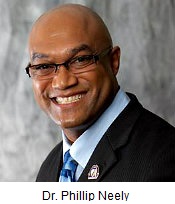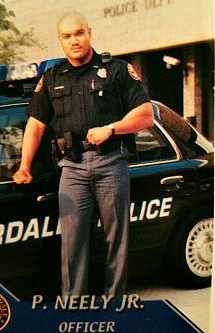Criminal Justice Careers: Getting Started In Law Enforcement
Earning an online degree can lead to any number of criminal justice careers. Check out one professor's advice based on a 20-year career as a cop.

Earning an online degree can lead to any number of criminal justice careers. Check out one professor's advice based on a 20-year career as a cop.


Dr. Phillip Neely's journey to a law enforcement career stemmed from a determination to work for the criminal justice system — and not be in the system.
With his father in prison, Neely had seen the other side, and although some told him he wouldn't go far in education, he pushed ahead.
Raised by his grandmother after his mother died, Neely would grow up to be the first in his family to become a law enforcement officer and the first to earn a doctorate. He served 21 years in Georgia, starting out as a street patrol officer and working as a corrections officer, sheriff's deputy, police commander, trainer of new officers and eventually becoming a major.
As he moved up the police ranks, Neely also was furthering his education. When he initially received his bachelor's degree in criminal justice from Saint Leo University, he aspired to become a police chief. But his interests changed during the years, and his graduate school experience inspired a passion for teaching.
Today, as an associate professor at Saint Leo's Gwinnett Education Center, Neely also works with students in the university's online criminal justice degree program. He serves as the faculty adviser for the online Criminal Justice Association, one of the many clubs and associations to help online degree students network and extend their learning outside the classroom. He enjoys working with students and wants to provide the same support that he relied on when he was pursuing his degrees.
Neely offers the following tips on getting started in law enforcement.

Dr. Neely: Students need to connect with their criminal justice instructors. Criminal justice faculty at Saint Leo have all worked in the field and have contacts in various organizations that could prove useful. Volunteer work and internships also can open doors and lead to permanent positions.
Dr. Neely: Working your way up through the ranks involves excellence in performance and continual professional training. Take advantage of as many opportunities as you can to learn and to build a solid foundation. Strive for excellence in the fundamentals. It also helps to have a strong mentor – someone you respect, trust and would like to emulate.
In addition, I also believe that education is key to a successful law enforcement career. Advanced degrees, such as Saint Leo's master's degree in criminal justice or critical incident management can help law enforcement officers stand out when promotions become available, and they are beneficial to candidates for federal law enforcement jobs.
Dr. Neely: Police work tends to fluctuate rapidly from a calm, controlled environment to one of high tension, unpredictability and chaos. Officers need adequate training to maintain restraint in this emotionally charged climate.
New law enforcement officers can manage their stress by accepting the fact that they will wind up in stressful situations and understand that their training will allow them to adapt and handle the problems they face.

Keep a calm head when the stress builds so you can think clearly. Physical fitness is also beneficial. A fit body makes for a fit mind.
Dr. Neely: Analytical, critical-thinking and problem-solving skills gained during education and training are crucial for success. Organizational skills, being detail oriented and resourceful, being able to collaborate and work in a team, being a good listener – all of these are important.
But most of all success requires integrity and the willingness to pull others up as you climb.
Dr. Neely: Expect to receive extensive training in basic law enforcement and field training. You will probably be paired with a training officer and may also rotate through different shifts. Expect to be challenged. Law enforcement is a rewarding and challenging career of service and commitment. It also is always in demand: law enforcement is a profession that will never go away.
Do you have any other questions for Dr. Neely about getting started in a law enforcement career?
Other posts you may be interested in reading:
5 TED Talks Every Criminal Justice Major Should Watch
Criminal Justice Careers: Preparing for the Unpredictable
Criminal Justice Careers: What's It Like to be an FBI Agent?
Faith Enables Cancer Survivor To Earn Online Criminal Justice Degree
Image Credits: Fer Gregory on Shutterstock and courtesy Philip Neely